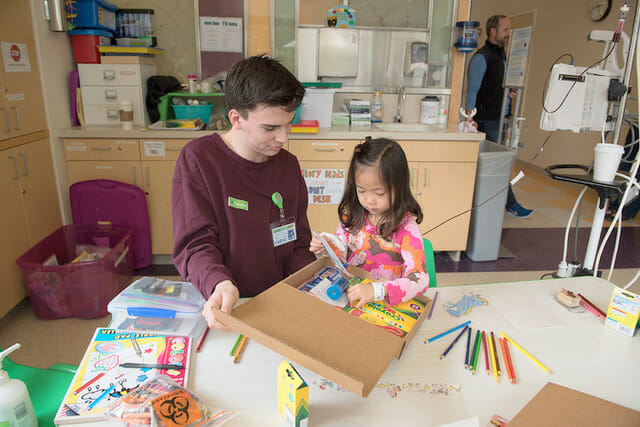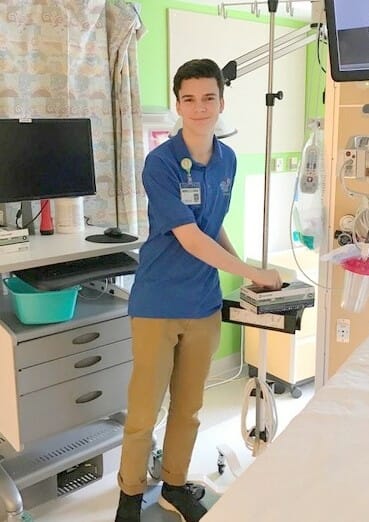High School Student Brings the Healing Power of Art Therapy to Pediatric Hospital Patients


There, he noticed one patient would give the pictures she had drawn to other oncology patients who were sitting alone. He then witnessed a mutual chain reaction of positive art therapy. The patient drawing and sharing the pictures saw increased confidence and the patients on the receiving end gained encouragement and love.
Malcolm did some research and found no other organization was focused on helping kids make and share art during their hospital stay, so he decided to start his own nonprofit, ArtPass. ArtPass is now a youth-led international nonprofit with 31 branches across four continents. Its vision is to change the way kids around the world perceive and experience the hospital through the power of art.
Malcolm is currently a junior at Cleveland High School in Portland, Oregon and still volunteers while acting as founder and executive director of ArtPass. We recently caught up with Malcolm to find out how he juggles being a student while running a nonprofit, and what he has learned through his experience as a volunteer.

What inspired you to volunteer?
As a kid, my grandma introduced my brother and me to volunteering by going downtown to feed the homeless. I would see how rewarding it was to give back to the community.
Describe your volunteer role with ArtPass.
I serve as the executive director and founder of ArtPass. My role with ArtPass is to develop new chapters, work on new initiatives, work to implement the curriculum in elementary schools and to partner with new hospitals.
Why do you think it’s important for others to give back?
It is important because there are so many people whose lives could improve from our little efforts.
What’s been the most rewarding part of your work?
The most rewarding part of ArtPass has been seeing the mindset of children during their hospital stay change. Seeing and hearing from kids from remote regions of the world that they feel less fearful and less anxious during their hospital stay is rewarding. We are changing lives every day.
Tell me about your volunteer work in Ghana and how that has impacted your work with ArtPass?
During my one month excursion, I discovered an issue there that was completely unaddressed. I went into the trip expecting to introduce art-sharing programs to the children in the pediatric wards, but I soon discovered there was an even larger need. In the hospital where I worked, monetary resources are incredibly scarce and they rely heavily on donations for essential medical supplies and equipment. Because all available resources are poured directly into medical treatment, the emotional well-being and hospital experience for young patients are often not addressed. I saw rooms where 15 kids were packed together in a space suited for 10 kids, all while enduring brutal 105 degree heat with no air conditioning. Children often conceal their symptoms from their parents to avoid being sent for treatment due to awareness of the miserable conditions in the pediatric wards. 5.4 million children a year die from preventable diseases like malaria, pneumonia and diarrhea. These easily treatable diseases can quickly become fatal if medical treatment isn’t sought in a timely manner, and many children do not receive medical attention until it is too late to treat. I saw there was this huge need that wasn’t being addressed and ArtPass evolved to meet that need. Our hope is to work toward a world where hospitalized youth in all 195 countries have access to art supplies.
What have you learned through your experiences as a volunteer?
I have learned there are many people willing to help you. I have had so much help for ArtPass from executives at other nonprofits, along with friends and family who have wanted to come together to support this goal.
Are there any future partnerships, programs, or events that you are excited about?
We are partnering with dozens of schools to implement our educational curriculum. This curriculum first goes over what symptoms to look out for in common, but lethal, diseases such as malaria and cholera. Then, it aims to encourage children to seek out medical attention and show that the hospital doesn’t have to be such an intimidating and scary place. After an extensive survey, we found our curriculum is 93% effective in changing kids’ perceptions and an increase in asking for medical help after participation in our program.
What do you want people to learn from your story?
I would like for people to learn when you see an issue in your community to take the initiative to make a change. You can take it further than you expect. Especially for young people, I would like them to learn change is possible and it is exciting to see.
How do you juggle going to school and your volunteering as executive director of ArtPass?
It has really been the support of our youth-led executive team, the help of our ArtPass global ambassadors, and countless nonprofit leaders, child life specialists, hospital administrators, friends and family. When I come home from school, I can work on the organization for four plus hours on a busy day. However, the incredible support I’ve received has definitely made everything possible.
This post was written by Karen Cohen.
Do you want to make a difference in your community like Malcolm? Visit All For Good to find local volunteer opportunities.
